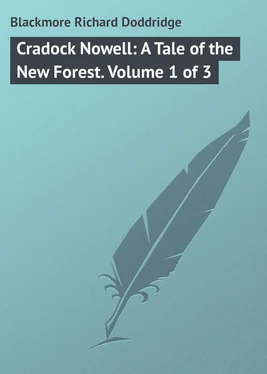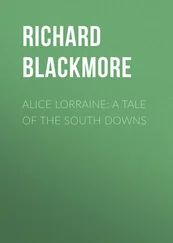Richard Blackmore - Cradock Nowell - A Tale of the New Forest. Volume 1 of 3
Здесь есть возможность читать онлайн «Richard Blackmore - Cradock Nowell - A Tale of the New Forest. Volume 1 of 3» — ознакомительный отрывок электронной книги совершенно бесплатно, а после прочтения отрывка купить полную версию. В некоторых случаях можно слушать аудио, скачать через торрент в формате fb2 и присутствует краткое содержание. Жанр: foreign_prose, на английском языке. Описание произведения, (предисловие) а так же отзывы посетителей доступны на портале библиотеки ЛибКат.
- Название:Cradock Nowell: A Tale of the New Forest. Volume 1 of 3
- Автор:
- Жанр:
- Год:неизвестен
- ISBN:нет данных
- Рейтинг книги:3 / 5. Голосов: 1
-
Избранное:Добавить в избранное
- Отзывы:
-
Ваша оценка:
- 60
- 1
- 2
- 3
- 4
- 5
Cradock Nowell: A Tale of the New Forest. Volume 1 of 3: краткое содержание, описание и аннотация
Предлагаем к чтению аннотацию, описание, краткое содержание или предисловие (зависит от того, что написал сам автор книги «Cradock Nowell: A Tale of the New Forest. Volume 1 of 3»). Если вы не нашли необходимую информацию о книге — напишите в комментариях, мы постараемся отыскать её.
Cradock Nowell: A Tale of the New Forest. Volume 1 of 3 — читать онлайн ознакомительный отрывок
Ниже представлен текст книги, разбитый по страницам. Система сохранения места последней прочитанной страницы, позволяет с удобством читать онлайн бесплатно книгу «Cradock Nowell: A Tale of the New Forest. Volume 1 of 3», без необходимости каждый раз заново искать на чём Вы остановились. Поставьте закладку, и сможете в любой момент перейти на страницу, на которой закончили чтение.
Интервал:
Закладка:
“And if itʼs wrong, then, sheʼll make it right”, thought the conscientious Biddy. “I can take my oath onʼt she knowed the differ from the very first; though nobody else couldnʼt see it, barring the caps they was put in. Now, if only that gossoon will consent to her see them, once more, and it canʼt hurt, the poor darlinʼ – and the blessing as comes from the deathʼs gaze – ”
Mrs. OʼGaghanʼs doubts were ended by the entrance of the doctor, a spare, short man, with a fiery face, red hair, and quick little eyes. He was not more than thirty years old, but knew his duties thoroughly; nevertheless, he would not have been there but for the sudden emergency. He was now come to fetch the nurse, having observed that the poor motherʼs eyes were gleaming feebly, once and again, towards the door that led to the nursery; and at last she had tried to raise her hand, and point in that direction. So in came Biddy, sobbing hard, with a babe on either arm; and she curtseyed cleverly to Sir Cradock without disturbing the equipoise. But the motherʼs glance was not judicial, as poor Biddy had expected – her heart and soul were far beyond rosettes, and even titles. In one long, yearning look, she lingered on her new–born babes, then turned those hazy eyes in fondness to her kneeling husbandʼs, then tried to pray or bless the three, and shivered twice, and died.
For days and weeks Sir Cradock Nowell bore his life, but did not live. All his clear intellect and strong will, noble plans, and useful labours, all his sense of truth and greatness, lay benumbed and frozen in the cold track of death. He could not bear to see his children, he would not even hear of them; “they had robbed him of his loved one, and what good were they? Little red things; perhaps he would love them when they grew like their mother”. Those were not his expressions, for he was proud and shy; but that was the form his thoughts would take, if they could take any. No wonder that he, for a time, was lost beyond the verge of reason; because that blow, which most of all stuns and defeats the upright man, had descended on him – the blow to the sense of justice. This a man of large mind feels often from his fellow–men, never from his Maker. But Sir Cradock was a man of intellect, rather than of mind. To me a large mind seems to be strong intellect quickened with warm heart. Sir Cradock Nowell had plenty of intellect, and plenty of heart as well, but he kept the two asunder. So much the better for getting on in the world; so much the worse for dealing with God. A man so constituted rarely wins, till overborne by trouble, that only knowledge which falls (like genius) where our Father listeth. So the bereaved man measured justice by the ells and inches of this world.
And it did seem very hard, that he who had lived for twenty years, from light youth up to the balance age of forty, not only without harming any fellow–mortal, but, upon fair average, to do good in the world – it seemed, I say – it was, thought he – most unjust that such a man could not set his serious heart upon one little treasure without losing it the moment he had learned its value. Now, with pride to spur sad memory – bronze spurs to a marble horse – he remembered how his lovely Violet chose him from all others. Gallant suitors crowded round her, for she was rich as well as beautiful; but she quietly came from out them all for him, a man of twice her age. And he who had cared for none till then, and had begun to look on woman as a stubby–bearded man looks back at the romance of his first lather, he first admired her grace and beauty, then her warmth of heart and wit, then, scorning all analysis, her own sweet self; and loved her.
A few days after the funeral he was walking sadly up and down in his lonely library, caring no whit for his once–loved books, for the news of the day, or his business, and listless to look at anything, even the autumn sunset; when the door was opened quietly, and shyly through the shadows stole his schoolfellow of yore, his truest friend, John Rosedew. With this gentleman I take a very serious liberty; but he never yet was known to resent a liberty taken honestly. That, however, does not justify me. “John Rosedew” I intend to call him, because he likes it best; and so he would though ten times a Bachelor of Divinity, a late Vice–Principal of his college, and the present Rector of Nowelhurst. Formerly I did my best, loving well the character, to describe that simple–minded, tender–hearted yeoman, John Huxtable, of Tossilʼs Barton, in the county of Devon. Like his, as like any two of Natureʼs ever–varied works, were the native grain and staple of the Rev. John Rosedew. Beside those little inborn and indying variations which Nature still insists on, that she may know her sons apart, those two genial Britons differed both in mental and bodily endowments, and through education. In spite of that, they were, and are, as like to one another as any two men can be who have no smallness in them. Small men run pretty much of a muchness; as the calibre increases, so the divergence multiplies.
Farmer Huxtable was no fool; but having once learned to sign his name, he had attained his maximum of literary development; John Rosedew, on the other hand, although a strong and well–built man, who had pulled a good oar in his day, was not, in bulk and stature, a match for Hercules or Milo. Unpretending, gentle, a lover of the truth, easily content with others, but never with himself, even now, at the age of forty, he had not overcome the bashfulness and diffidence of a fine and sensitive nature. And, first–rate scholar as he was, he would have lost his class at Oxford solely through that shyness, unless a kind examiner, who saw his blushing agony, had turned from some commonplace of Sophocles to a glorious passage of Pindar. Then, carried away by the noble poet, John Rosedew forgot the schools, the audience, even the row of examiners, and gave grand thoughts their grand expression, breathing free as the winds of heaven. Nor till his voice began to falter from the high emotion, and his heart beat fast, though not from shame, and the tears of genius touched by genius were difficult to check, not till then knew he, or guessed, that every eye was fixed upon him, that every heart was thrilling, that even the stiff examiners bent forward like eager children, and the young men in the gallery could scarcely keep from cheering. Then suddenly, in the full sweep of magnificence, he stopped, like an eagle shot.
Now the parson, ruddy cheeked, with a lock of light brown hair astray upon his forehead, and his pale, blue eyes looking much as if he had just awoke and rubbed them, came shyly and with deep embarrassment into the darkening room. For days and days he had thought and thought, but could not at all determine whether, and when, and how, he ought to visit his ancient friend. His own heart first suggested that he ought to go at once, if only to show the bereaved one that still there were some to love him. To this right impulse – and the impulse of a heart like this could seldom be a wrong one – rose counter–checks of worldly knowledge, such little as he had. And it seemed to many people strange and unaccountable, that if Mr. Rosedew piqued himself upon anything whatever, it was not on his learning, his purity, or benevolence, it was not on his gentle bearing, or the chivalry of his soul, but on a fine acquirement, whereof in all opinions (except, indeed, his own) he possessed no jot or tittle – a strictly–disciplined and astute experience of the world. Now this supposed experience told him that it might seem coarse and forward to offer the hard grasp of friendship ere the soft clasp of love was cold; that he, as the clergyman of the parish, would appear to presume upon his office; that no proud man could ever bear to have his anguish pryed into. These, and many other misgivings and objections, met his eager longings to help his dear old friend.
Читать дальшеИнтервал:
Закладка:
Похожие книги на «Cradock Nowell: A Tale of the New Forest. Volume 1 of 3»
Представляем Вашему вниманию похожие книги на «Cradock Nowell: A Tale of the New Forest. Volume 1 of 3» списком для выбора. Мы отобрали схожую по названию и смыслу литературу в надежде предоставить читателям больше вариантов отыскать новые, интересные, ещё непрочитанные произведения.
Обсуждение, отзывы о книге «Cradock Nowell: A Tale of the New Forest. Volume 1 of 3» и просто собственные мнения читателей. Оставьте ваши комментарии, напишите, что Вы думаете о произведении, его смысле или главных героях. Укажите что конкретно понравилось, а что нет, и почему Вы так считаете.












